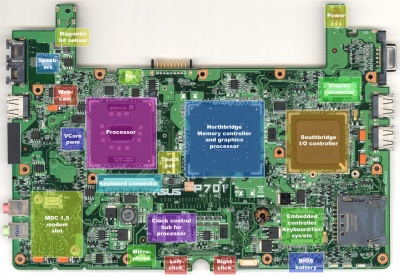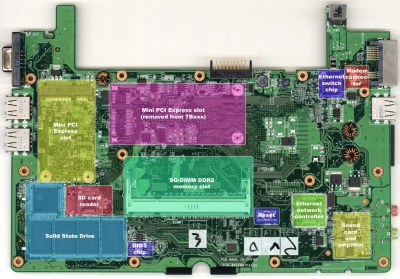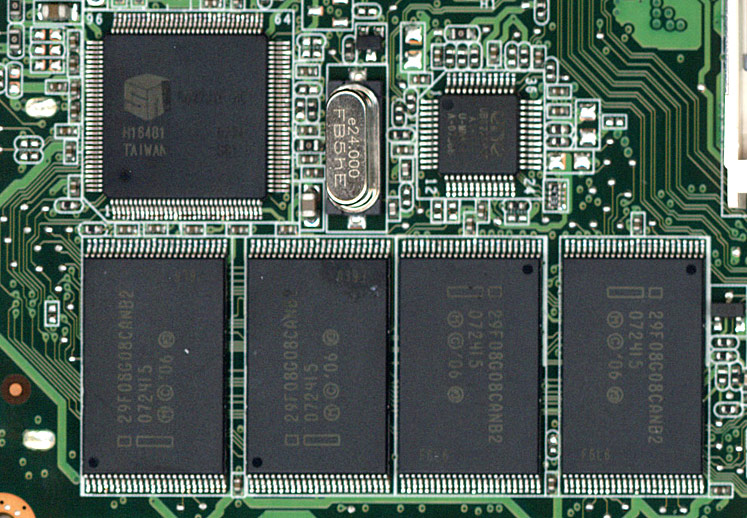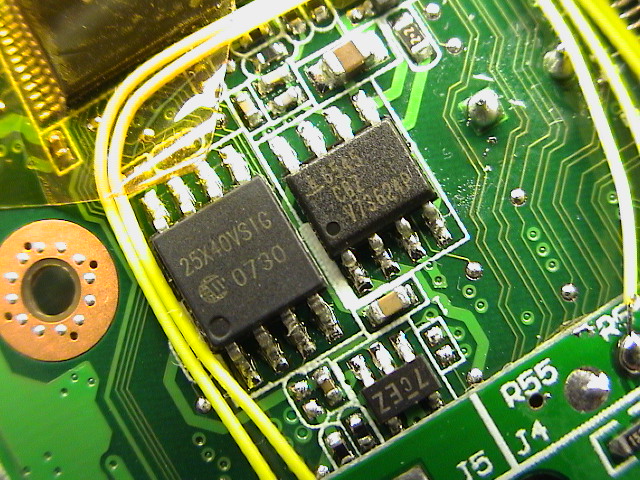Eee PC
This is the Asus Eee PC 701 4G ultra-portable computer releases in the fall 2007. It features a 7-inch widescreen display and 4 GB Solid State Drive (SSD) as the boot drive.
My Eee PC
- Pearl white ordered from Qbit Online in Taiwan
- Model: 701-W0002 - Chinese/US keyboard
- Serial: 7BOAAQXXXX (first 6)
- Motherboard rev: 701
- Battery: 5200 mAh
- No Mini-PCIe connector
Specifications
Dimensions:
- Width: 22.5 cm
- Depth: 16.5 cm
- Height: 2.1-3.5 cm
- Weight: 920 grams
Research
Chips and Connections
A simple diagram showing the major chips and connections on the motherboard.
Front:

Back:

Solid State Drive
The solid state drive on the Eee is powered by a Silicon Motion SM223 CF flash card controller and 4x NAND flash chips from various manufacturers.
NAND flash found:
- Hynix 8Gbit HY27UG088G5M
- Intel 8Gbit 29F08G08CANB2 (found on mine)
BIOS Chip
For a little while there was confusion how the BIOS was stored. Speculation about parts of the SSD could be used for the BIOS, integrated chipset BIOS, or a unknown IC-chip.
Turns out the BIOS chip was covered by a adhesive label and the part number is Winbond 25X40VSIG. It features a 8-pin 512K serial flash.
Overclocking
- CPU frequency (FSB x multiplier): n/a
- Front-Side-Bus frequency (quad-pumped bus rate)): n/a
- Bus speed: n/a
Benchmarks
Accessories
- Logitech Nano Mouse
- Microsoft Bluetooth Notebook 5000 / 4000
- LG GSA-E50L Slim DVD Writer
Internal Upgrades
USB hub
To install devices internally, more USB-connections are needed. I hooked into one of the regular USB-ports and routed the D+/D- signals from the southbridge/controller to a 4 port USB-hub. To make the port I hooked into work again, one of the 4 ports is connected back to the USB-port (Hub-to-USB-port and USB-port-to-HUB).
I installed 2 hubs this way to get enough ports and load balancing the bandwidth. Having two storage devices on the same upstream connection is not a good idea speed-wise.
The reason I choose to hook into the USB-port and leave the spare Mini-PCIe USB connection alone is that I want to:
- Be able to use Mini-PCIe cards based on USB later
- Disable the USB-ports in BIOS and disable all the new devices
- Not have the devices disabled if I used the webcam or wifi connections
More information about USB hubs over at Wikipedia.
GPS with antenna
Bluetooth 2.0+EDR
SDHC card reader
Pendrive
Power switch
- Integrated: Webcam, Wifi PCIe adapter, SD card reader, Sound card, Atheros eithernet, Atheros Mini-PCIe adapter
- USB hub: Bluetooth, SD card reader, GPS adapter, FM transmitter
Modem
The modem port on the Eee is stuffed with a piece of black foam and not used. The modem is not installed on any Eee machine but the internal connection points are still there. The modem card connected via a MDC v1.5 connection, and 12 pin header for the card and the 2 pin header to connect to the RJ-11 jack is still in place on all current 4G motherboards.
Asus is still providing the Windows driver for the Conexant 56K modem on their download site, look for Modem_XP.zip
The modem card can be found on various Dell, Acer, and Sony laptops. On Ebay the Conexant card can be found under these model numbers:
- Conexant 56K Modem RD02-D110
- M5804 (Dell part number)
Wifi
The wifi-card on the Eee is only 802.11b/g, not the latest draft-N. The card is can be easily changed by removing two screws and unmounting the card from the Mini-PCI Express socket.
After searching around I found a Intel 4965agn 802.11a/b/g/n Mini-PCIe card for a decent price.
Since 802.11n is MIMO (Multiple Input Multiple Output) it requires 3 antennas for optimal performance and range. I had a dead Nintendo Wii which happens to use the same antenna connectors for it's Broadcom wireless-card. The connector type on the Intel card is Hirose U.FL-R-SMT and on the antenna U.FL-LP-066.
Other Possible Internal Upgrades
- USB relay power switch
- New keyboard (non-taiwanese) [2]
- FM transmitter
- CPU/GPU/Chipset voltage mod
- Silicon Motion NAND flash replacement
- Modemport - Wifi antenna, additional ethernet port
- Modemport as a switch - remove to turn off, plug in to power
BIOS Revisions
Official Asus Eee PC ftp directory: USA Taiwan Asus Update Utility Eee PC directory: Asus.com
Newer releases last, sorted chronologically.
Tools:
8804
- Download
- Bios date 2007-07-25, initial release
- Available via Asus Update
- Full 100 MHz FSB
- Chip report as an Intel I915GM rather than Intel I910GML
- Wireless and screen flickering problems reported
0302
- Bios date 2007-10-10
- FSB lowered to 70 MHz
0204
- Download
- Bios date 2007-10-05
- Fixes USB2 and webcam problems
0401
- Download
- Bios date 2007-10-17
- Fix sometimes password is requested when entering setup
Optimize Windows XP
Linux Hardware Output
Output [3]:
00:00.0 Host bridge: Intel Corporation Mobile 915GM/PM/GMS/910GML Express Processor to DRAM Controller (rev 04) 00:02.0 VGA compatible controller: Intel Corporation Mobile 915GM/GMS/910GML Express Graphics Controller (rev 04) 00:02.1 Display controller: Intel Corporation Mobile 915GM/GMS/910GML Express Graphics Controller (rev 04) 00:1b.0 Audio device: Intel Corporation 82801FB/FBM/FR/FW/FRW (ICH6 Family) High Definition Audio Controller (rev 04) 00:1c.0 PCI bridge: Intel Corporation 82801FB/FBM/FR/FW/FRW (ICH6 Family) PCI Express Port 1 (rev 04) 00:1c.1 PCI bridge: Intel Corporation 82801FB/FBM/FR/FW/FRW (ICH6 Family) PCI Express Port 2 (rev 04) 00:1c.2 PCI bridge: Intel Corporation 82801FB/FBM/FR/FW/FRW (ICH6 Family) PCI Express Port 3 (rev 04) 00:1d.0 USB Controller: Intel Corporation 82801FB/FBM/FR/FW/FRW (ICH6 Family) USB UHCI #1 (rev 04) 00:1d.1 USB Controller: Intel Corporation 82801FB/FBM/FR/FW/FRW (ICH6 Family) USB UHCI #2 (rev 04) 00:1d.2 USB Controller: Intel Corporation 82801FB/FBM/FR/FW/FRW (ICH6 Family) USB UHCI #3 (rev 04) 00:1d.3 USB Controller: Intel Corporation 82801FB/FBM/FR/FW/FRW (ICH6 Family) USB UHCI #4 (rev 04) 00:1d.7 USB Controller: Intel Corporation 82801FB/FBM/FR/FW/FRW (ICH6 Family) USB2 EHCI Controller (rev 04) 00:1e.0 PCI bridge: Intel Corporation 82801 Mobile PCI Bridge (rev d4) 00:1f.0 ISA bridge: Intel Corporation 82801FBM (ICH6M) LPC Interface Bridge (rev 04) 00:1f.2 IDE interface: Intel Corporation 82801FBM (ICH6M) SATA Controller (rev 04) 00:1f.3 SMBus: Intel Corporation 82801FB/FBM/FR/FW/FRW (ICH6 Family) SMBus Controller (rev 04) 01:00.0 Ethernet controller: Atheros Communications, Inc. AR5007EG 802.11 b/g Wireless PCI Express Adapter (rev 01) 03:00.0 Ethernet controller: Atheros Technology Corp. L2 100 Mbit Ethernet Adapter (rev a0)
Datasheets
- Intel 910GML northbridge chipset with integrated GMA900
- Intel 82801FBM ICH6-M I/O controller hub southbridge
- Intel Celeron M 90 nm processor
- ICS 9LPR426A Low power programmable timing control hub of P4 processors
- AU Optronics A070VW04 7" monitor
- ENE KB3920 embedded controller
References
- Eee PC 701 detailed information
- USB hub, bluetooth and SD reader internal upgrade
- Notebookreview Eee PC Tweaks and Pictures
- Eee PC Hardware FAQ Wiki
- Internal USB gadgets on miniPCIe connector
- tnkgrl USB research
- Overclock EEE PC
- Power consumption USB devices
- Mac OS X on a flash drive
- RFID Windows log-on
- Eee PC i alles hender
- Asus Eee PC Exclusive Inside Look
- Will Solid State Drive be replaceable?
- Asus EEE News, Mods, and Hacks
- 802.11n Wifi Modification
- Official Asus EEE forum
- Bios 8804 not fully working
- Modding Eee 701 with internal bluetooth / Engadget
- Keyboard light mod
- Request: PPL picture / Solved: 900 Mhz under Linux - Module
- Russian Eee 700 review
- Eee PC USB Hub + Bluetooth + 4 GB flash - Chinese
- Eee PC USB Hub + Bluetooth - Chinese
- 8804 bios poll for XP
- Modify generic 12v car adapter to supply 9.5v
- Connecting to GPRS via bluetooth/phone
- Eee + Hub + 2x 16 GB Corsair Voyager
- Eee 8G 994 MHz overclock
- Mini PCI Express Bus Description
- Eee PC 4G Surf without door memory upgrade

